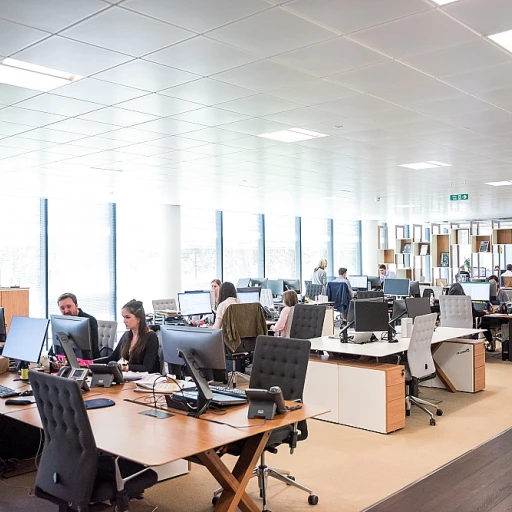
Understanding the Skills Gap
Exploring the Skills Gap
In today's rapidly evolving job market, there exists a critical gap between the skills that businesses require and those that job seekers possess. This "skills gap" is not a new phenomenon, but one that has become increasingly pronounced as technology advances and industries demand more specialized expertise. It affects various sectors, predominantly those in STEM (Science, Technology, Engineering, and Mathematics) fields.
Institutions like the MIT (Massachusetts Institute of Technology) have recognized the need to address this disparity. Through initiatives such as the MISTI (MIT International Science and Technology Initiatives) Global Teaching Labs, efforts are being made to equip students with the necessary skills to thrive in a modern workforce. These global teaching programs not only benefit students by enhancing their learning but also support instructors in delivering more effective education. With a focus on critical thinking and problem-solving, participants gain valuable experiences that are directly applicable to their future careers.
Each day, programs like MISTI GTL enhance education around the world by partnering with schools and colleges to deliver equal education opportunities. In Wales, for instance, the Wales Programme collaborates closely with the Welsh Government to align educational strategies with the needs of the local economy. It emphasizes the importance of STEM subjects and professional learning, aiming to lay a solid foundation for aspiring professionals. This collaboration ensures that both students and educators are prepared to meet the ever-changing demands of the global job market, all while fostering a spirit of innovation and adaptability.
The endeavor to bridge the skills gap through global teaching labs is integral to creating a workforce equipped for the challenges of tomorrow. By investing in transformative educational experiences and forming strong education partnerships, it is possible to address this issue at its core, preparing students for lasting success in their respective fields. The next sections will delve into specific teaching methods, case studies, and the challenges faced by these initiatives as they work towards closing the skills gap worldwide.
The Role of Global Teaching Labs
Global Teaching Labs: A Catalyst for Change
The initiative of Global Teaching Labs (GTL), particularly those facilitated through collaborations like MIT's MISTI Global Teaching Labs, have become pivotal in addressing the skills gap in various regions. These programs provide a platform where students and instructors from different educational institutions can participate in a mutually beneficial exchange of knowledge and practices. GTL programs are designed to immerse students in diverse cultural and educational environments. Through this exposure, students rapidly enhance their understanding of STEM subjects and develop critical thinking and problem-solving skills. The Wales Programme, for instance, offers a unique setting for young minds to expand their horizons in science, technology, engineering, and mathematics, which are all crucial for the modern workforce. It's noteworthy that these programs not only benefit students but also enhance the professional learning journey for instructors involved. By engaging with various education partners and local schools and colleges, instructors gain insights into different teaching methodologies and are better equipped to leverage innovative techniques in their own teaching. Moreover, such international teaching initiatives align with the objectives of creating an environment of equal education. They empower learners with diverse opportunities regardless of their location, consequently reducing the skills gap. Through the strategic support of government bodies like the Welsh government, these teaching labs provide an excellent model of how education can be adapted globally to cater to specific skill shortages. By partnering with schools and colleges worldwide, MIT students participating in these programs bring fresh perspectives and innovative approaches that bolster problem-solving and critical thinking in real-world contexts. Such experiences are essential for fostering a new generation of learners who are well-prepared to tackle future challenges in science, engineering, and beyond.Innovative Teaching Methods
Exploring Innovative Approaches to Education
In the journey to bridge the skills gap, innovative methods in international teaching initiatives have proven vital. Through the lens of various teaching programs, such as those offered by institutes like MIT, novel strategies have emerged that are reshaping the educational landscape. The concept of Global Teaching Labs (GTL) is one such innovation. Programs like MISTI’s GTL offer hands-on, practical education experiences which focus on critical thinking and problem solving—skills essential for tackling real-world challenges. By integrating these approaches into the curriculum, global teaching initiatives emphasize the importance of equipping students with capabilities beyond traditional academic achievements. Furthermore, integrating STEM subjects into educational programs through international platforms has brought about significant advancements. In places like Wales, collaborations between local schools and global teaching labs have resulted in educational initiatives that foster professional learning among students and instructors alike. These programs highlight the importance of making science, technology, engineering, and mathematics accessible and engaging to students, preparing them for future roles in these crucial fields. By assessing the day-to-day activities in these teaching labs, one can see the commitment towards an equal education for all. Education partners across the globe are working in tandem to provide comprehensive learning experiences that are not restricted by geographical boundaries. The role of MIT students in these programs, for example, showcases a model where knowledge transfer occurs on a global scale, propelling both the instructors and learners towards mutual growth. Innovative teaching methods do not come without challenges. It requires concerted efforts from institutes, students, and government bodies such as the Welsh Government to ensure these educational programs are not just experimental but are viable, sustainable options for future generations. The progress made in STEM-focused programs is a testament to the collaborative work across borders, and the education of students in schools and colleges benefits from these enriched teaching methods. As these teaching methodologies evolve, the hope is that, with continued support and innovation, programs like MISTI GTL will lead the way in providing key insights and solutions to close the skills gap, thereby contributing significantly to the advancement of global education.Case Studies: Success Stories
Inspirational Outcomes from Global Teaching Initiatives
The challenge of addressing the skills gap in critical areas such as STEM subjects, particularly science and technology, presents numerous opportunities to embrace global teaching as a solution. With programs like MISTI (MIT International Science and Technology Initiatives) and GTL (Global Teaching Labs) gaining traction, real-world success stories have emerged, showcasing the effectiveness and transformative potential of these initiatives. One significant success story comes from the MISTI Global Teaching Labs program, which offers MIT students the chance to travel abroad to teach in schools and colleges across the globe. In January each year, enthusiastic MIT students venture out to locations like Wales, leveraging their expertise in science, technology, engineering, and mathematics. This program is designed not only to enhance students' learning but also to advance professional learning among instructors and elevate education standards in host schools. Schools in Wales, such as those participating in the GTL Wales initiative, have witnessed remarkable improvements in students' engagement with STEM subjects. By integrating critical thinking and problem solving into the curriculum, students are gaining valuable skills that are highly sought after in today's job market. The infusion of fresh, global perspectives from international programs underlines the equal education emphasis by the Welsh government, aiming to foster innovation and a deeper understanding of global challenges. Education partners involved in the Wales programme have reported increased engagement among students, who are inspired by the teaching methods implemented by MIT Global Teaching Labs. These teaching labs serve as a platform to redefine how students perceive and approach complex subjects, encouraging a mindset that aligns with the evolving demands of science engineering and technology fields. Moreover, the partnership between global teaching labs and local educational institutions highlights the potency of international collaboration. Such partnerships are fortifying the bridge between theoretical learning and practical application, a crucial component in equipping students with the competencies to thrive in a dynamic, globalized world. Amid these successes, the global teaching efforts continue to evolve, responding to challenges and uncovering new prospects for achieving seamless integration of advanced educational methodologies across diverse geographical contexts. As the narrative of skills gap resolution unfolds, it is clear that global teaching initiatives are paving the way for a more inclusive and dynamic approach to education, setting a precedent for future educational endeavors.Challenges Faced by Global Teaching Labs
Overcoming Barriers in International Teaching Labs
With the burgeoning interest in addressing the skills gaps, international teaching initiatives like MIT's Global Teaching Labs (GTL) are stepping into pivotal roles. However, as these programs gain momentum across different regions, they encounter several challenges that could potentially hinder their effectiveness and reach. One of the significant obstacles is the adaptation to diverse educational infrastructures and systems. Each region or country often has unique curricula and educational standards. For example, in programs like Wales' initiative, aligning the curriculum with local schools and colleges while incorporating science and technology from global insights proves complex. The variances in pedagogy and resource availability require innovative solutions to ensure equal education access and quality. Cultural differences also present challenges that global teaching labs must navigate carefully. Melding local customs with international teaching methodologies demands a level of cultural literacy from MIT students and other instructors involved. This aspect becomes crucial in creating an environment conducive to engagement and authentic learning. Sensitivity towards cultural differences ensures that the educational content is relevant and resonant with local communities. Logistical constraints, such as day-to-day operations, funding, and resource allocation, are pragmatic challenges faced by these programs. MISTI (MIT International Science and Technology Initiatives) and similar entities often work with education partners to secure funding and resources. However, sustaining these collaborations requires continuous strategic management and alignment with the long-term objectives of both the participating institutions and the local education authorities. Additionally, there's the pressing need for continual professional development to equip instructors with the latest teaching techniques and improved problem-solving capabilities. Programs often incorporate ongoing professional learning initiatives focusing on STEM subjects, aimed at cultivating critical thinking among students. Yet, ensuring that MIT students and other educators maintain up-to-date knowledge year after year remains a perennial challenge. The future success of these international teaching programs lies in overcoming these challenges. By doing so, they can ensure that the skills imparted not only bridge the skills gap but also prepare students to thrive in a fast-evolving global landscape. Addressing these hurdles head-on will enrich both the instructors and the students, fostering a collaborative learning experience that is both impactful and enduring.Future Prospects and Opportunities
htmlShaping the Future in Education
As the landscape of education continues to evolve, the potential of international teaching initiatives is becoming increasingly evident. With the aid of collaborative efforts such as the MIT Global Teaching Labs (GTL) and similar programs, education is witnessing a transformation that transcends geographical boundaries. The focus on STEM subjects within the GTL Wales programme highlights the pressing need for science and technology education, aligning with the objectives set by the Welsh Government to bolster skills in these critical areas.
In the coming years, the ambitious aims of such programs will depend heavily on fostering a culture of innovation and continuous learning. By adopting modern and effective teaching methodologies, students across the globe, including those in schools and colleges in Wales, are poised to gain remarkable skills in problem-solving and critical thinking.
These teaching labs serve as a bridge narrowing the skills gap, fueled by the dedication of MIT students and other proactive instructors who are committed to enhancing equal education opportunities. These initiatives not only aim to equip students with the necessary technical knowledge but also prepare them for real-world challenges, paving the way for future leaders in science and engineering.
However, to realize these prospects, collaboration with education partners remains pivotal. Professional learning environments must evolve to accommodate innovative approaches. The integration of diverse teaching techniques will ensure that learners can maximize their potential, setting a new benchmark in educational standards globally.
As we move forward, the role of these global teaching programs will be instrumental in redefining education and continuously adapting to the ever-changing demands of today's world. Every day presents a new opportunity for progress, and with sustained commitment, these teaching initiatives will undoubtedly lead to lasting positive impact in global education.













